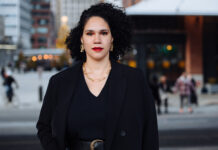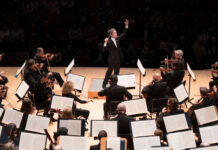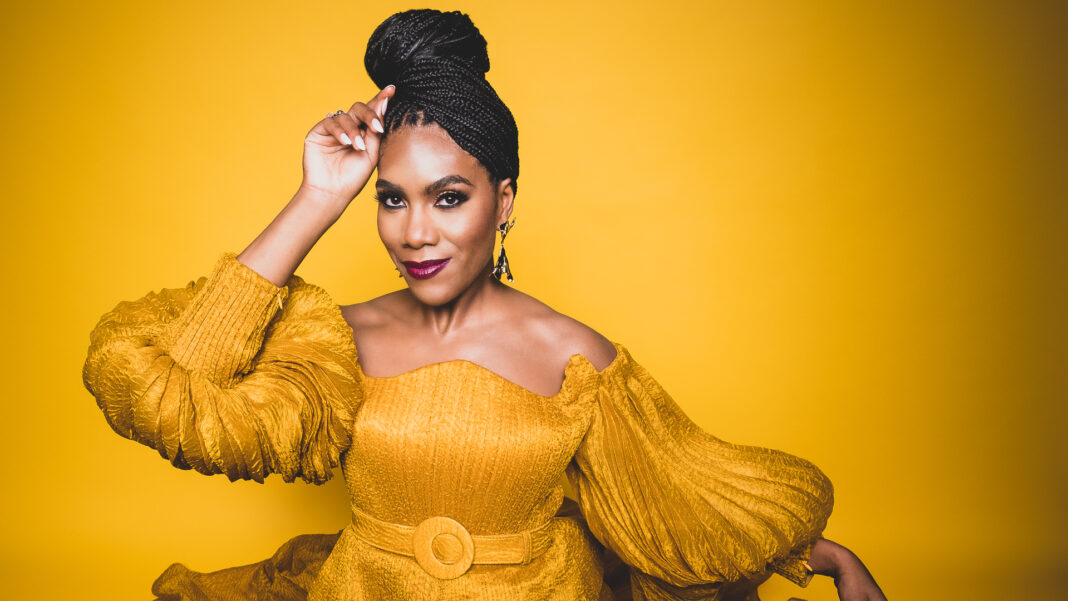Arguably one of the most deeply personal song cycles ever written is Neruda Songs by composer Peter Lieberson. He wrote the five songs that make up this work for his wife, mezzo-soprano Lorraine Hunt Lieberson. Using the poetry of Pablo Neruda, Neruda Songs had its world premiere in 2005 by the Los Angeles Philharmonic. On June 2nd and 5th, the LA Phil will once again perform Neruda Songs as part of their Power to the People! Festival with J’Nai Bridges as the soloist.

Bridges sang the role of Queen Nefertiti in the Metropolitan Opera production of Ahknahten by Philip Glass. The recording of that production won a Grammy Award earlier this year. She created the role of Josefa Segovia in the world premiere of John Adams’ Girls of the Golden West at San Francisco Opera and has appeared in productions of Carmen, Samson et Dalil and Satyagraha.
It should be noted that just over a year after Lorraine Hunt Lieberson debuted Neruda Songs she passed away following a battle with breast cancer. Peter faced his own battle with lymphoma and passed away five years later. Thankfully they were able to record Neruda Songs. It was that recording that Bridges first heard as a grad student at the Curtis Institute of Music in Philadelphia as she told me when we spoke earlier this month.
What follows are excerpts from our conversation that have been edited for length and clarity. I urge you to go to our YouTube channel to see the full interview.
What was your first reaction when you discovered Neruda Songs?
I remember hearing a recording and going down the rabbit hole of YouTube and Lorraine Hunt Lieberson. I was obsessed with her. I still am. I think that her voice and her artistry is of the utmost importance. The first song actually that I happened upon was Amor mío, si muero y tú no mueres [My love, if I die and you don’t], the final song in the set. I just was so captured by that song and I was waiting for the moment to be able to sing it with the orchestra. That actually happened with Maestro Dudamel over the pandemic. So that really kind of wet my palate and I said I have to do all of them with him specifically.
When you enter into something that was so deeply personal for these two do you feel like you’re entering into a private moment of their lives?
An interesting question. Yes, absolutely. That’s the beauty of these particular songs. It’s like you’re there with them almost. This is extremely intimate. For them to be as vulnerable as they were, and I think outward in their love, it’s such a gift to be able to enter their world. I think many artists will agree that the goal is to really tap into the mind and the heart and the spirit of the composer and the librettist. So it’s made especially, I wouldn’t say easy, but Lieberson has afforded the singer to enter their worlds without much confusion. He lays it all out there. He predicted things in a way, but it doesn’t feel at all sad. It’s just like this eternal love that will be there through life and through death. There’s no beginning. There’s no ending. It’s really special. I’ve learned a lot about life through these particular songs.
In 2007, Peter Lieberson was asked his thoughts about other singers singing Neruda Songs. And he said, “I think it might be more difficult for the singer than for me.” What do you think?
I agree. First of all, if we just speak musically, there are some twists and turns that are not so straight forward. But it actually just makes beautiful sense. But the subject matter, of course, it’s like you have to dig deep and that’s not easy. I have yet to experience a love like theirs. But that’s the beauty of being a singing actress. I’m tapping into that and I honestly feel like I’m manifesting something through through these poems. But yes, he is correct in that I think it’s probably more difficult for the singer on a plethora of levels.
How much of your personal background informs your approach to this song cycle about love and loss?
Hmm. Wow. Well, yeah, you’re right. As an artist I want to bring bring my life and my experiences into everything that I sing and communicate. I’ve experienced love. I’ve experienced loss. And I do have a subtext for every piece. Neruda has written the poetry and Lieberson has set it so beautifully. But I always ask myself who is J’Nai in this? I try to attach different experiences to different moments in the cycle and that really helps it be authentic to me.
What Lorraine Lieberson did was mind-blowing. That was authentic to her and to their love. So while I definitely admire and actually study her very closely, I do things differently because I’m different and my experience of life is different. I think the tricky part is facing myself in in these poems and having to unearth different experiences and loss and remember certain loves that are actually still there, but they’ve just transformed.
Alex Ross wrote in The New Yorker that “There is a dimension to these songs which is especially moving and almost too much to take at times.” He was speaking from the audience perspective, what’s your perspective from the stage?
Wow. That’s really brilliant. My goal is to actually, at times, make the audience feel as if it’s too much because it’s a lot. Every single emotion is being captured in these poems and it’s not always easy. I go through that same process in the practice room. I can’t necessarily do that on stage or else I won’t get through the songs. But I do have to be in a place in which I’ve dug deep and have been vulnerable so that the audience can then come there with me. I agree that expressing that sometimes is too much. But what is too much? It’s necessary. This is life. And I think these poems really bring up so many themes that we need to focus on. I feel like they’re actually, in the end, very spiritual and healing.
I love what Lieberson does with Neruda Songs because he makes melody front and center. What role does melody play in the pieces of music, particularly contemporary music, that you choose to perform?

Interesting. Never been asked that, but I love that. That’s a great question. I love melody. I don’t really know any singer that doesn’t love melody. But in terms of contemporary music Lieberson has a way of, like you said, putting the melody upfront and forward. Yet there are these moments that are extremely intellectual and complex, but somehow it just makes so much sense. I’m in the practice room and I play the piano. So I’m just figuring out the chord progressions and it’s actually still a melody. He has a seamless way of aligning what we know as a traditional melody and the more complex phrases and linking them up in a way that is just like, wow, what just happened? I don’t know, but I feel very satisfied and it feels physically really natural on the chords. This is really such a pleasure to sing.
I want to close by asking you about something that Lorraine Hunt Lieberson told The Boston Globe in 2005. She said, “Music is a vehicle that can transport very high levels of energy. It’s something that can lift you out of a narrow little place and out of everyday existence.” What does music in general and singing Neruda Songs do for you, and by extension, the musicians around you and the audience in the hall?
These songs give me hope. They really do. It’s not always easy being an opera singer and someone that is basically nomadic and on the road all the time. Sometimes these dark thoughts come in and I think I’m never going to find love or this world is just crumbling. But these songs really present the gift of eternal life and hope. It’s always such a blessing to sing pieces that really have such a profound effect on me. I feel changed. I really do from these poems. I just wish that I could speak to [the Liebersons] directly. But I feel that their spirit is definitely shining down and through me. I do hope that the audience also will feel some healing and a sense of hope. I think we all could use that.
To see the full interview with J’Nai Bridges, please go here.
Main Photo: J’Nai Bridges (Photo by Dario Acosta/Courtesy Unison Media)











